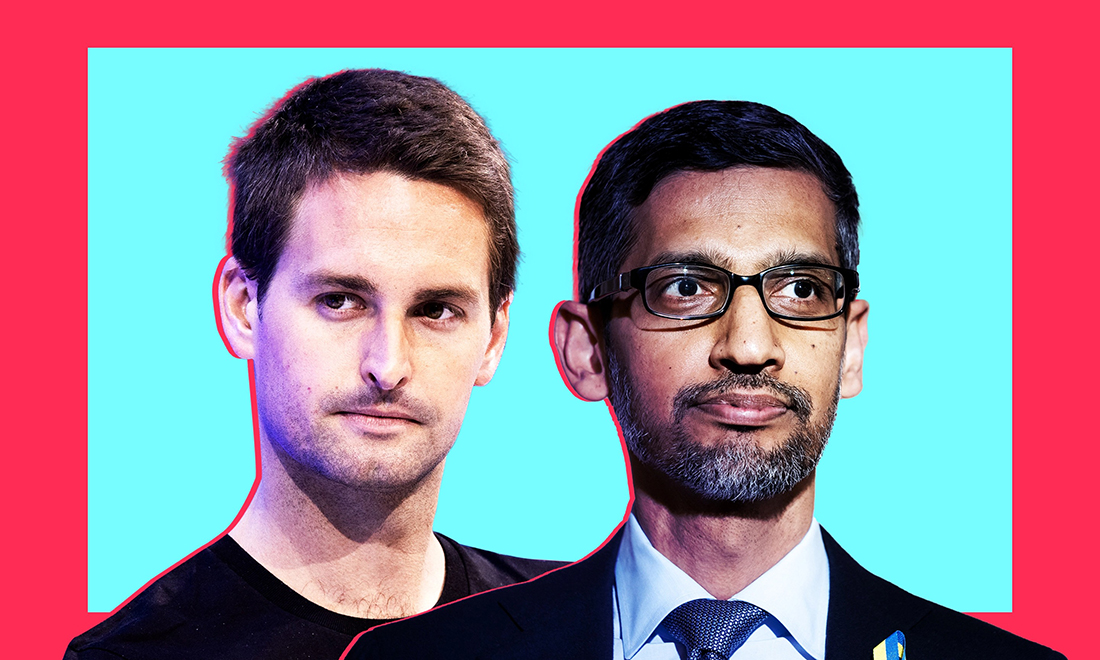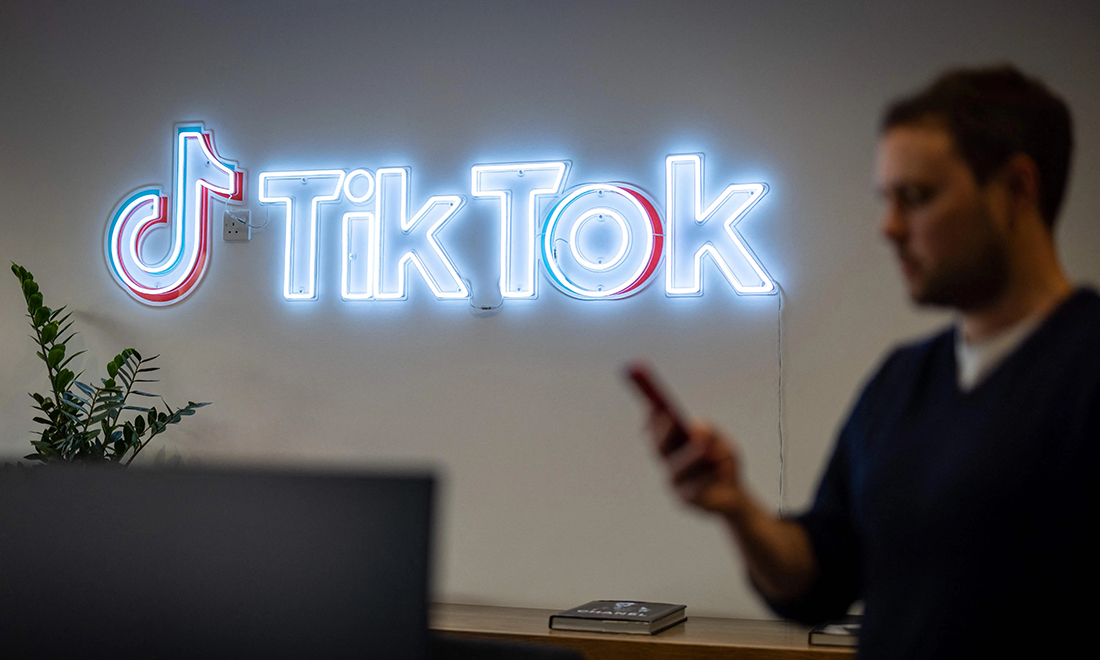
上周,,Alphabet的首席執(zhí)行官桑達(dá)爾·皮查伊在洛杉磯舉辦的一個(gè)科技會(huì)議上發(fā)表講話時(shí),指出他的公司面臨來(lái)自“不知從哪里冒出來(lái)”的勇敢新進(jìn)公司帶來(lái)的威脅,。
“三年前,,我們都沒(méi)有人談?wù)揟ikTok?!逼げ橐猎诖a大會(huì)(Code Conference)上對(duì)觀眾說(shuō),。他將這款流行的中國(guó)社交媒體應(yīng)用程序稱為Alphabet的“新興”競(jìng)爭(zhēng)對(duì)手之一。
一天后,,當(dāng)Snap的首席執(zhí)行官埃文·斯皮格爾在同一場(chǎng)會(huì)議上提到TikTok時(shí),,他似乎在談?wù)撘患彝耆煌墓尽8鶕?jù)斯皮格爾的說(shuō)法,,TikTok是一個(gè)龐然大物,,花費(fèi)“數(shù)十億美元”來(lái)?yè)屨际袌?chǎng)份額,并從Snapchat等應(yīng)用程序搶走用戶,。
這兩種看似矛盾的評(píng)價(jià)凸顯了這款視頻分享應(yīng)用程序在多大程度上引發(fā)了硅谷大型科技公司的關(guān)注和擔(dān)憂,。就TikTok帶來(lái)的威脅的性質(zhì)而言,它們可能意見(jiàn)不一,,但科技行業(yè)的大型公司一致認(rèn)為,,來(lái)自海外的新興競(jìng)爭(zhēng)對(duì)手帶來(lái)的危機(jī)迫在眉睫,與它們以前面臨的任何威脅都不同,。
TikTok擁有超過(guò)10億用戶,,在短短幾年時(shí)間里就躍升為全球頂級(jí)互聯(lián)網(wǎng)社交媒體服務(wù)商。TikTok是字節(jié)跳動(dòng)旗下的一款應(yīng)用程序,。字節(jié)跳動(dòng)是一家中國(guó)科技公司,,這給原本可能被視為競(jìng)爭(zhēng)格局中的一場(chǎng)標(biāo)準(zhǔn)洗牌增加了地緣政治變數(shù)。
在整個(gè)硅谷,,關(guān)于TikTok的話題無(wú)處不在,。在大型會(huì)議和公司會(huì)議上,,每個(gè)人都有自己的觀點(diǎn)。
當(dāng)被問(wèn)及大型科技公司最近對(duì)TikTok的評(píng)論時(shí),,企業(yè)家及天使投資人賈森·卡拉坎尼斯給《財(cái)富》雜志發(fā)消息稱:“我們?cè)试S這款軟件在美國(guó)運(yùn)行,,真是瘋了——[這]與競(jìng)爭(zhēng)無(wú)關(guān),而是與影響力和安全有關(guān),?!?/p>
當(dāng)然,TikTok在過(guò)去也曾經(jīng)受到審查,,最著名的是美國(guó)前總統(tǒng)唐納德·特朗普試圖在美國(guó)禁止該應(yīng)用程序,。但當(dāng)聯(lián)邦法官阻止了這一提議時(shí),這一努力最終以失敗告終,。在當(dāng)時(shí)的許多觀察人士看來(lái),,特朗普的反TikTok運(yùn)動(dòng)是一種過(guò)度反應(yīng),既出于個(gè)人不滿,,也出于所謂的安全考慮,。
但隨著TikTok的勢(shì)頭持續(xù)增長(zhǎng),,以及中美關(guān)系持續(xù)緊張,,科技行業(yè)對(duì)這款視頻分享應(yīng)用程序越來(lái)越感到不安。為了遏制TikTok的發(fā)展,,老牌科技公司的應(yīng)對(duì)策略看起來(lái)難以預(yù)測(cè),,從前一天譴責(zé)該公司轉(zhuǎn)變?yōu)榈诙炷7滤?/p>
今年3月,《華盛頓郵報(bào)》(Washington Post)報(bào)道稱,,F(xiàn)acebook的母公司Meta聘請(qǐng)了一家共和黨咨詢公司,,傳播TikTok是中國(guó)字節(jié)跳動(dòng)旗下產(chǎn)品的消息,從而引發(fā)民眾擔(dān)憂,。幾個(gè)月后,,也就是2020年8月,Meta在美國(guó)(在Facebook和Instagram上)推出了Reels,,這是一款與TikTok幾乎相同的短視頻產(chǎn)品,。谷歌旗下的視頻網(wǎng)站YouTube和Snap都發(fā)布了自己的TikTok版本,分別名為Shorts和Spotlight,。
孩子和廣告商都沉迷于TikTok
這些模仿產(chǎn)品似乎都無(wú)法復(fù)制TikTok的成功,。
9月12日,《華爾街日?qǐng)?bào)》(Wall Street Journal)查閱了一份內(nèi)部研究文件,,該文件顯示,,Instagram用戶每天觀看Reels的總時(shí)長(zhǎng)為1,760萬(wàn)小時(shí),還不到TikTok用戶每天觀看1.978億小時(shí)的十分之一,。文件還顯示,,在Reels上分享的視頻中,約有三分之一最初是在另一個(gè)應(yīng)用程序上制作的,通常是TikTok,,并帶有表明其來(lái)源的水印或邊框,。
企業(yè)家及Cost Plus Drugs的聯(lián)合創(chuàng)始人馬克·庫(kù)班將TikTok的成功歸功于其依靠人工智能識(shí)別和分享視頻的策略,而不是Facebook,、推特(Twitter)和Snapchat使用的傳統(tǒng)的朋友和熟人“社交圖譜”,。
“TikTok的敏捷程度非常驚人。內(nèi)容帶他們?nèi)ツ睦?,他們就去哪里,。”?kù)班告訴《財(cái)富》雜志,。

庫(kù)班指出,,版權(quán)是TikTok的一個(gè)潛在弱點(diǎn)。他說(shuō),,財(cái)力雄厚的競(jìng)爭(zhēng)對(duì)手可以鎖定音樂(lè),、電影和體育的獨(dú)家版權(quán)。
“肯定有多種方法能夠擊敗TikTok,?!睅?kù)班說(shuō)?!暗@不會(huì)在一夜之間發(fā)生,。”
據(jù)彭博社(Bloomberg)報(bào)道,,TikTok在2021年創(chuàng)造了近40億美元的收入,,預(yù)計(jì)今年將達(dá)到120億美元。這與Facebook和Instagram的母公司Meta在2022年第二季度獲得的282億美元廣告收入相比只是九牛一毛,,但廣告業(yè)業(yè)內(nèi)人士表示,,TikTok處于有利地位,。
戰(zhàn)略公司W(wǎng)hisper Advisors的合伙人賈森·拉普對(duì)《財(cái)富》雜志表示,大型科技公司的擔(dān)憂是有道理的,無(wú)論是迪士尼(Disney)和Netflix,,還是Meta和Snap,。
“沉迷于TikTok的不僅僅是孩子們,,廣告商也在關(guān)注TikTok,。”拉普說(shuō),。
與此同時(shí),,由于美國(guó)經(jīng)濟(jì)放緩,加之iPhone的制造商蘋(píng)果(Apple)推出的新隱私功能削弱了定向數(shù)字廣告的盈利能力,,美國(guó)頂級(jí)消費(fèi)互聯(lián)網(wǎng)公司數(shù)月來(lái)紛紛宣布裁員,。Snap在8月下旬裁掉了20%的員工,,Meta則開(kāi)始解雇通過(guò)算法隨機(jī)選出來(lái)的員工。這并不是說(shuō)TikTok完全不受經(jīng)濟(jì)低迷的影響,。據(jù)《連線》雜志(Wired)報(bào)道,,作為“全公司重組”的一部分,該公司在7月進(jìn)行了裁員,。
隨著美國(guó)政府對(duì)TikTok的打擊逼近,,那些自身正面臨反壟斷監(jiān)管機(jī)構(gòu)更嚴(yán)格審查的老牌互聯(lián)網(wǎng)公司可能會(huì)從中獲利,以抵御它們的中國(guó)對(duì)手,。
TikTok堅(jiān)稱,,其應(yīng)用程序與中國(guó)母公司字節(jié)跳動(dòng)分開(kāi)運(yùn)行,并且沒(méi)有與中國(guó)的運(yùn)營(yíng)部門共享美國(guó)用戶數(shù)據(jù),。但美國(guó)國(guó)會(huì)議員和一些業(yè)內(nèi)人士并不信服,。
但在硅谷對(duì)TikTok的癡迷背后,可能是對(duì)互聯(lián)網(wǎng)企業(yè)殘酷現(xiàn)實(shí)的清醒認(rèn)識(shí),?;ヂ?lián)網(wǎng)企業(yè)是在美國(guó)本土發(fā)展和完善的。一旦用戶轉(zhuǎn)向下一個(gè)熱門產(chǎn)品,,消費(fèi)者互聯(lián)網(wǎng)企業(yè)很少會(huì)出現(xiàn)反彈,。包括美國(guó)在線(AOL)、雅虎(Yahoo)和MySpace在內(nèi)的互聯(lián)網(wǎng)巨頭紛紛倒下,,這表明,,即使是最強(qiáng)大的消費(fèi)者網(wǎng)絡(luò)企業(yè),,也可能衰落得很快,,而且這種衰落過(guò)程不可阻擋。
庫(kù)班在1999年將一家網(wǎng)絡(luò)公司出售給雅虎,,由此發(fā)家,。他深知互聯(lián)網(wǎng)企業(yè)無(wú)情的本質(zhì)。
庫(kù)班說(shuō):“所有其他大型社交平臺(tái)都曾經(jīng)一度看起來(lái)不可戰(zhàn)勝,。如今,,它們的受眾正在流向TikTok?!保ㄘ?cái)富中文網(wǎng))
譯者:中慧言-王芳
上周,,Alphabet的首席執(zhí)行官桑達(dá)爾·皮查伊在洛杉磯舉辦的一個(gè)科技會(huì)議上發(fā)表講話時(shí),指出他的公司面臨來(lái)自“不知從哪里冒出來(lái)”的勇敢新進(jìn)公司帶來(lái)的威脅,。
“三年前,,我們都沒(méi)有人談?wù)揟ikTok?!逼げ橐猎诖a大會(huì)(Code Conference)上對(duì)觀眾說(shuō),。他將這款流行的中國(guó)社交媒體應(yīng)用程序稱為Alphabet的“新興”競(jìng)爭(zhēng)對(duì)手之一,。
一天后,當(dāng)Snap的首席執(zhí)行官埃文·斯皮格爾在同一場(chǎng)會(huì)議上提到TikTok時(shí),,他似乎在談?wù)撘患彝耆煌墓?。根?jù)斯皮格爾的說(shuō)法,TikTok是一個(gè)龐然大物,,花費(fèi)“數(shù)十億美元”來(lái)?yè)屨际袌?chǎng)份額,,并從Snapchat等應(yīng)用程序搶走用戶。
這兩種看似矛盾的評(píng)價(jià)凸顯了這款視頻分享應(yīng)用程序在多大程度上引發(fā)了硅谷大型科技公司的關(guān)注和擔(dān)憂,。就TikTok帶來(lái)的威脅的性質(zhì)而言,,它們可能意見(jiàn)不一,但科技行業(yè)的大型公司一致認(rèn)為,,來(lái)自海外的新興競(jìng)爭(zhēng)對(duì)手帶來(lái)的危機(jī)迫在眉睫,,與它們以前面臨的任何威脅都不同。
TikTok擁有超過(guò)10億用戶,,在短短幾年時(shí)間里就躍升為全球頂級(jí)互聯(lián)網(wǎng)社交媒體服務(wù)商,。TikTok是字節(jié)跳動(dòng)旗下的一款應(yīng)用程序。字節(jié)跳動(dòng)是一家中國(guó)科技公司,,這給原本可能被視為競(jìng)爭(zhēng)格局中的一場(chǎng)標(biāo)準(zhǔn)洗牌增加了地緣政治變數(shù),。
在整個(gè)硅谷,關(guān)于TikTok的話題無(wú)處不在,。在大型會(huì)議和公司會(huì)議上,,每個(gè)人都有自己的觀點(diǎn)。
當(dāng)被問(wèn)及大型科技公司最近對(duì)TikTok的評(píng)論時(shí),,企業(yè)家及天使投資人賈森·卡拉坎尼斯給《財(cái)富》雜志發(fā)消息稱:“我們?cè)试S這款軟件在美國(guó)運(yùn)行,,真是瘋了——[這]與競(jìng)爭(zhēng)無(wú)關(guān),而是與影響力和安全有關(guān),?!?/p>
當(dāng)然,TikTok在過(guò)去也曾經(jīng)受到審查,,最著名的是美國(guó)前總統(tǒng)唐納德·特朗普試圖在美國(guó)禁止該應(yīng)用程序,。但當(dāng)聯(lián)邦法官阻止了這一提議時(shí),這一努力最終以失敗告終,。在當(dāng)時(shí)的許多觀察人士看來(lái),,特朗普的反TikTok運(yùn)動(dòng)是一種過(guò)度反應(yīng),既出于個(gè)人不滿,,也出于所謂的安全考慮,。
但隨著TikTok的勢(shì)頭持續(xù)增長(zhǎng),以及中美關(guān)系持續(xù)緊張,,科技行業(yè)對(duì)這款視頻分享應(yīng)用程序越來(lái)越感到不安,。為了遏制TikTok的發(fā)展,,老牌科技公司的應(yīng)對(duì)策略看起來(lái)難以預(yù)測(cè),從前一天譴責(zé)該公司轉(zhuǎn)變?yōu)榈诙炷7滤?/p>
今年3月,,《華盛頓郵報(bào)》(Washington Post)報(bào)道稱,,F(xiàn)acebook的母公司Meta聘請(qǐng)了一家共和黨咨詢公司,傳播TikTok是中國(guó)字節(jié)跳動(dòng)旗下產(chǎn)品的消息,,從而引發(fā)民眾擔(dān)憂,。幾個(gè)月后,也就是2020年8月,,Meta在美國(guó)(在Facebook和Instagram上)推出了Reels,,這是一款與TikTok幾乎相同的短視頻產(chǎn)品。谷歌旗下的視頻網(wǎng)站YouTube和Snap都發(fā)布了自己的TikTok版本,,分別名為Shorts和Spotlight,。
孩子和廣告商都沉迷于TikTok
這些模仿產(chǎn)品似乎都無(wú)法復(fù)制TikTok的成功。
9月12日,,《華爾街日?qǐng)?bào)》(Wall Street Journal)查閱了一份內(nèi)部研究文件,,該文件顯示,Instagram用戶每天觀看Reels的總時(shí)長(zhǎng)為1,760萬(wàn)小時(shí),,還不到TikTok用戶每天觀看1.978億小時(shí)的十分之一,。文件還顯示,在Reels上分享的視頻中,,約有三分之一最初是在另一個(gè)應(yīng)用程序上制作的,,通常是TikTok,并帶有表明其來(lái)源的水印或邊框,。
企業(yè)家及Cost Plus Drugs的聯(lián)合創(chuàng)始人馬克·庫(kù)班將TikTok的成功歸功于其依靠人工智能識(shí)別和分享視頻的策略,,而不是Facebook、推特(Twitter)和Snapchat使用的傳統(tǒng)的朋友和熟人“社交圖譜”,。
“TikTok的敏捷程度非常驚人,。內(nèi)容帶他們?nèi)ツ睦铮麄兙腿ツ睦?。”?kù)班告訴《財(cái)富》雜志,。
庫(kù)班指出,,版權(quán)是TikTok的一個(gè)潛在弱點(diǎn)。他說(shuō),,財(cái)力雄厚的競(jìng)爭(zhēng)對(duì)手可以鎖定音樂(lè),、電影和體育的獨(dú)家版權(quán)。
“肯定有多種方法能夠擊敗TikTok,?!睅?kù)班說(shuō),。“但這不會(huì)在一夜之間發(fā)生,?!?/p>
據(jù)彭博社(Bloomberg)報(bào)道,TikTok在2021年創(chuàng)造了近40億美元的收入,,預(yù)計(jì)今年將達(dá)到120億美元,。這與Facebook和Instagram的母公司Meta在2022年第二季度獲得的282億美元廣告收入相比只是九牛一毛,但廣告業(yè)業(yè)內(nèi)人士表示,,TikTok處于有利地位,。
戰(zhàn)略公司W(wǎng)hisper Advisors的合伙人賈森·拉普對(duì)《財(cái)富》雜志表示,大型科技公司的擔(dān)憂是有道理的,,無(wú)論是迪士尼(Disney)和Netflix,,還是Meta和Snap。
“沉迷于TikTok的不僅僅是孩子們,,廣告商也在關(guān)注TikTok,。”拉普說(shuō),。
與此同時(shí),,由于美國(guó)經(jīng)濟(jì)放緩,加之iPhone的制造商蘋(píng)果(Apple)推出的新隱私功能削弱了定向數(shù)字廣告的盈利能力,,美國(guó)頂級(jí)消費(fèi)互聯(lián)網(wǎng)公司數(shù)月來(lái)紛紛宣布裁員,。Snap在8月下旬裁掉了20%的員工,Meta則開(kāi)始解雇通過(guò)算法隨機(jī)選出來(lái)的員工,。這并不是說(shuō)TikTok完全不受經(jīng)濟(jì)低迷的影響,。據(jù)《連線》雜志(Wired)報(bào)道,作為“全公司重組”的一部分,,該公司在7月進(jìn)行了裁員,。
隨著美國(guó)政府對(duì)TikTok的打擊逼近,那些自身正面臨反壟斷監(jiān)管機(jī)構(gòu)更嚴(yán)格審查的老牌互聯(lián)網(wǎng)公司可能會(huì)從中獲利,,以抵御它們的中國(guó)對(duì)手,。
TikTok堅(jiān)稱,其應(yīng)用程序與中國(guó)母公司字節(jié)跳動(dòng)分開(kāi)運(yùn)行,,并且沒(méi)有與中國(guó)的運(yùn)營(yíng)部門共享美國(guó)用戶數(shù)據(jù),。但美國(guó)國(guó)會(huì)議員和一些業(yè)內(nèi)人士并不信服。
但在硅谷對(duì)TikTok的癡迷背后,,可能是對(duì)互聯(lián)網(wǎng)企業(yè)殘酷現(xiàn)實(shí)的清醒認(rèn)識(shí),。互聯(lián)網(wǎng)企業(yè)是在美國(guó)本土發(fā)展和完善的,。一旦用戶轉(zhuǎn)向下一個(gè)熱門產(chǎn)品,,消費(fèi)者互聯(lián)網(wǎng)企業(yè)很少會(huì)出現(xiàn)反彈,。包括美國(guó)在線(AOL)、雅虎(Yahoo)和MySpace在內(nèi)的互聯(lián)網(wǎng)巨頭紛紛倒下,,這表明,,即使是最強(qiáng)大的消費(fèi)者網(wǎng)絡(luò)企業(yè),也可能衰落得很快,,而且這種衰落過(guò)程不可阻擋,。
庫(kù)班在1999年將一家網(wǎng)絡(luò)公司出售給雅虎,由此發(fā)家,。他深知互聯(lián)網(wǎng)企業(yè)無(wú)情的本質(zhì),。
庫(kù)班說(shuō):“所有其他大型社交平臺(tái)都曾經(jīng)一度看起來(lái)不可戰(zhàn)勝。如今,,它們的受眾正在流向TikTok,。”(財(cái)富中文網(wǎng))
譯者:中慧言-王芳
When Alphabet CEO Sundar Pichai spoke at a tech conference in Los Angeles last week, he pointed to the threat his company faced from a plucky upstart that had come “from nowhere.”
“None of us were talking about TikTok three years ago,” Pichai told the audience at the Code Conference, describing the popular Chinese social media app as one of Alphabet’s “emerging” rivals.
A day later, when Snap CEO Evan Spiegel mentioned TikTok at the same conference, he seemed to be talking about a completely different company. To hear Spiegel tell it, TikTok was a colossus, spending “billions and billions and billions of dollars” to grab market share and steal users from apps like Snapchat.
The two seemingly contradictory assessments underscore the extent to which the Chinese video-sharing app has captured the attention, and the fears, of Silicon Valley’s most powerful players. They may not agree on the specific nature of the TikTok threat, but the tech industry’s dominant companies are united in their belief that their young competitor from overseas is a clear and present danger unlike any they’ve faced before.
With more than 1 billion users, TikTok has risen to the top tier of the world’s internet social media services in just a few short years. Its ownership by ByteDance, a Chinese tech company, has added a geopolitical twist to what might otherwise have played out as a standard shake-up in the competitive landscape.
Throughout Silicon Valley, the subject of TikTok is pervasive; at conferences and in company meetings, everyone has an opinion.
“We are insane to allow it to operate in the USA—[it] has nothing to do with competition, everything to do with influence and security,” the entrepreneur and angel investor Jason Calacanis messaged Fortune when asked about Big Tech’s recent comments about TikTok.
TikTok has drawn scrutiny in the past, of course, most famously when former President Donald Trump sought to have the app banned in the U.S. That effort ultimately failed when a federal judge blocked the proposition. To many observers at the time, Trump’s anti-TikTok crusade was an overreaction driven as much by personal grievance as by purported security concerns.
But as TikTok’s momentum has continued to grow, and as relations between the U.S. and China have remained tense, the tech industry has become increasingly agitated over the video-sharing app. To try to blunt TikTok’s progress, the established tech companies have at times looked erratic, shifting from denouncing the company one day to imitating it the next.
In March, the Washington Post reported that Facebook parent company Meta had hired a Republican consulting firm to spread stories raising concerns about TikTok’s Chinese ownership. A few months later, in August 2020, Meta launched Reels in the U.S. (on Facebook and Instagram), a short-form video product virtually identical to TikTok. YouTube, the video website owned by Google, and Snap have each released their own TikTok equivalents, called Shorts and Spotlight, respectively.
Kids and advertisers alike are addicted to TikTok
None of those copycat features appear to have replicated the success of TikTok.
On September 12, the Wall Street Journal reviewed an internal research document that showed Instagram users watch Reels for a total of 17.6 million hours each day, which is less than one-tenth of the 197.8 million hours TikTok users apparently watch daily. The document also showed that about one-third of the videos shared on Reels were originally produced on another app, typically TikTok, and bear a watermark or border designating their origin.
Mark Cuban, entrepreneur and cofounder of Cost Plus Drugs, credits TikTok’s success to, among other things, its strategy of relying on artificial intelligence to identify and share videos rather than the traditional “social graphs” of friends and acquaintances used by Facebook, Twitter, and Snapchat.
“TikTok is shockingly agile. They go where the content takes them,” Cuban told Fortune.
Cuban points to licensing rights as a potential weak spot for TikTok. A deep-pocketed rival could lock up exclusive rights to music, movies, and sports, he said.
“There are certainly multiple paths to beat TikTok,” Cuban said. “They just won’t happen overnight.”
TikTok generated nearly $4 billion in revenue in 2021 and is projected to hit $12 billion this year, according to Bloomberg. That’s a fraction of the $28.2 billion in ad revenue that Facebook and Instagram parent Meta brought in from advertising in the second quarter of 2022, but advertising industry insiders say TikTok has the wind at its back.
Jason Rapp, a partner at strategy firm Whisper Advisors, told Fortune that Big Tech is right to be worried, whether it’s Disney and Netflix or Meta and Snap.
“It’s not just kids who are addicted to TikTok, and advertisers are paying attention,” Rapp said.
Meanwhile, America’s top consumer internet firms have been announcing layoffs in waves for months as the U.S. economy has slowed and as new privacy features by iPhone maker Apple have crimped the ability to profit from targeted digital advertising. Snap laid off 20% of its workforce in late August, and Meta began layoffs by randomly selecting them with an algorithm. That’s not to say TikTok is completely unaffected by the downturn; the firm conducted its own layoffs in July as a part of “companywide restructuring,” according to Wired.
With the specter of a U.S. government crackdown on TikTok looming, the established internet companies—who themselves are facing heightened scrutiny from antitrust regulators—may get a helping hand to fend off their Chinese foe.
TikTok insists that its app is run separately from the ByteDance mothership in China, and that no U.S. user data is shared with operations in China. But U.S. lawmakers and some industry insiders are not convinced. Companies like Facebook, Google, and Twitter are banned from operating in China. Calacanis, the angel investor, believes tech executives should be taking a similar stand against allowing China into the U.S. market.
But behind some of Silicon Valley’s TikTok obsession may be a recognition of the brutal reality of the internet business, developed and perfected on American soil. Consumer internet businesses rarely bounce back once users have moved on to the next hot thing. The list of fallen internet giants, including AOL, Yahoo, and MySpace, speaks to the rapid and inexorable decline that can strike even the mightiest consumer web businesses.
Cuban, who made his initial fortune selling a dotcom firm to Yahoo in 1999, knows the unforgiving nature of the internet business.
“All the other big social platforms have at one time or another seemed undefeatable,” said Cuban. “Now, they are losing audience to TikTok.”






